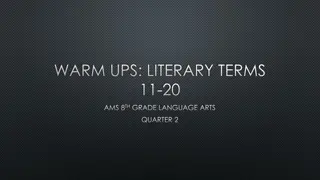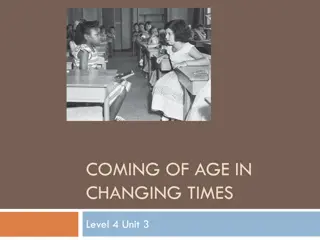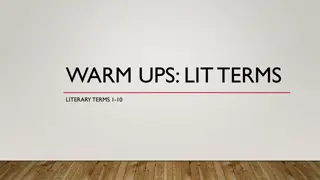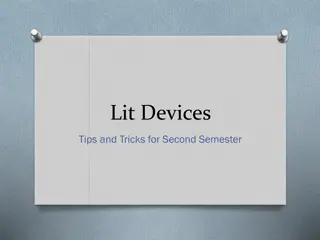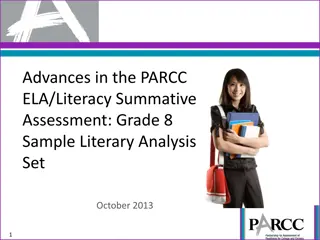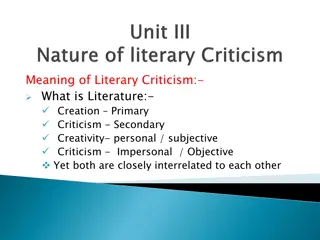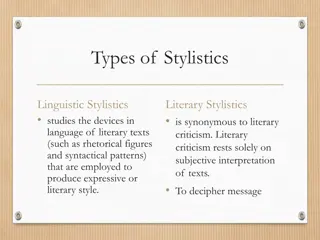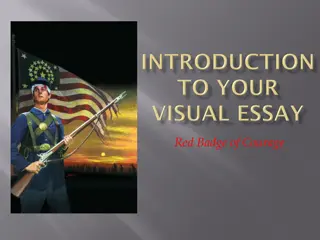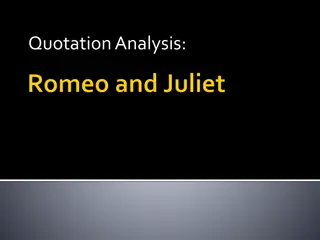Mastering Literary Analysis: Essential Guidelines and Examples
Learn the importance of using the literary present tense, citing sources accurately, and referencing authors correctly when analyzing works of literature. Understand how to punctuate direct quotes and apply in-text citations effectively. Improve your writing skills with practical examples and tips for creating a scholarly paper.
Download Presentation

Please find below an Image/Link to download the presentation.
The content on the website is provided AS IS for your information and personal use only. It may not be sold, licensed, or shared on other websites without obtaining consent from the author. Download presentation by click this link. If you encounter any issues during the download, it is possible that the publisher has removed the file from their server.
E N D
Presentation Transcript
Literary Present Tense Literary Present Tense When we write about a work of literature, we use the present tense of the verb. It is a current work, not something confined to the past. For Example: When Johnny dies dies, he leaves sense of hope for the future. NOT NOT When Johnny died died, he left sense of hope for the future. leaves Ponyboy with a left Ponyboy with a
YOUR TURN The Outsiders (is/was) a work of literature that (portrays/portrayed) the difficulty of growing up in a gang environment.
AUTHOR Author Name Author Name The first first time you mention the author (in the introduction) introduction), you will use the author s full name and last. After that, you refer to the author only by last name. Do not use a title such as Mr., Mrs., Dr., etc. full name, first For Example: Hinton likes to have the boys rough house to show their competitive nature and playfulness. NOT NOT- Susie or Ms. Hinton likes to have
YOUR TURN Look at this sentence. Not from an introduction paragraph Once (Gordon Korman/Mr. Korman/Korman) establishes his humor, he adds comic relief throughout the novel.
NOVEMBER 12, 2014 In In- -text Citation text Citation When you use the exact words of the author (not an example but a direct quote from the book), you must put those words those words in quotation marks and give credit to the source. After the end quote, put the page # and then the period. Use only the numeral, no # or p. or pg. There is no need to put Hinton (the author s last name) in the parentheses when the paper is only analyzing one work and no other sources are being utilized. Hinton is implied. page # in parentheses,
EXAMPLES/NONEXAMPLES Correct: Correct: I figured Southern gentleman had nothing on Johnny Cade (120). Incorrect: I figured Southern gentleman had nothing on Johnny Cade. (Hinton, pg. 120).
YOUR TURN This is a direct quote from page 16 Darry Darry didn't deserve to work like an old man didn't deserve to work like an old man when he was only twenty. when he was only twenty. Punctuate it properly as if you were citing it in your essay.
ANSWER Darry Darry didn't deserve to work like an old didn't deserve to work like an old man when he was only twenty (16). man when he was only twenty (16). Quotation marks Only page number inside parentheses Period OUTSIDE end parenthesis
CITING QUOTED MATERIAL The quote inside a quote This is handled the same way, except words already inside quotation marks must be put in single quotes, and the whole quote from the book placed in double quotes. It will look like this ---------------- (160).
EXAMPLES I was crazy, you know that, kid? Crazy for wantin Johnny to stay out of trouble, for not wantin him to get hard (147). What d he want? Two-Bit asked. What d Mr. Super-Soc have to say? (118).
YOUR TURN From page 78 Johnny shrugged. Yeah, he said with a sigh. I guess we re different. Punctuate it properly as if you were citing it in your essay.
ANSWER Johnny shrugged. Yeah, he said with a sigh. I guess we re different (78).
REMINDER This is for quotes ONLY! You do not need a citation for examples, such as Dally robs a grocery and pulls a gun on the police.
SKIP THIS SLIDE! Fragments and Run Fragments and Run- -ons ons Fragments Fragments- -: : A fragment is not a complete thought. A fragment is not a complete thought. It It may be may be missing a subject or a verb. It is always missing a subject or a verb. It is always missing a complete thought! missing a complete thought! Your turn Your turn - - page 44 page 44 Run Run- -ons: ons: A run A run- -on sentence occurs when two or more sentences on sentence occurs when two or more sentences are written as one. are written as one. Your turn Your turn - - page 46 #1 page 46 #1- -8 only 8 only







